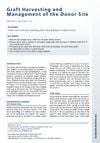 2 citations,
September 2014 in “Journal of The American Academy of Dermatology”
2 citations,
September 2014 in “Journal of The American Academy of Dermatology” Obesity may worsen hair loss in men and increase hirsutism in overweight or obese individuals, with weight loss recommended for treatment.
 2 citations,
August 2013 in “Facial Plastic Surgery Clinics of North America”
2 citations,
August 2013 in “Facial Plastic Surgery Clinics of North America” The conclusion is that careful planning and technique in hair transplant surgery are crucial for successful graft harvesting and minimizing scars, with proper aftercare to avoid complications.
 2 citations,
August 2010 in “Journal of the American Academy of Dermatology”
2 citations,
August 2010 in “Journal of the American Academy of Dermatology” A 65-year-old woman has a growing bald spot on her scalp.
 1 citations,
May 2021 in “Journal of Cosmetic Dermatology”
1 citations,
May 2021 in “Journal of Cosmetic Dermatology” Cosmetic foam product reduces hair loss and increases hair density in men.
 1 citations,
April 2021 in “The journal of investigative dermatology/Journal of investigative dermatology”
1 citations,
April 2021 in “The journal of investigative dermatology/Journal of investigative dermatology” mTORC1 activity is important for hair growth and color, and targeting it could help treat hair loss and greying.
 1 citations,
April 2021 in “Journal of Investigative Dermatology”
1 citations,
April 2021 in “Journal of Investigative Dermatology” The ingredients could help prevent hair loss by promoting hair growth and increasing VEGF secretion.
 1 citations,
March 2021 in “Current Dermatology Reports”
1 citations,
March 2021 in “Current Dermatology Reports” Various treatments help hair growth, but more research needed for safety and effectiveness.
 1 citations,
January 2020 in “Skin appendage disorders”
1 citations,
January 2020 in “Skin appendage disorders” Hair transplants for male baldness can show inflammation and fibrosis, but more research is needed to confirm LPP presence.
 1 citations,
November 2018 in “International research journal of pharmacy”
1 citations,
November 2018 in “International research journal of pharmacy” Platelet Rich Plasma (PRP) treatment is safe and effective for hair growth in people with androgenic alopecia, and can also help treat bacterial infections.
 1 citations,
October 2017 in “Food Additives & Contaminants: Part A”
1 citations,
October 2017 in “Food Additives & Contaminants: Part A” A new minoxidil-like substance, triaminodil, was found in an illegal hair growth supplement.
 1 citations,
July 2017 in “The Journal of Urology”
1 citations,
July 2017 in “The Journal of Urology” Low-dose finasteride and dutasteride reduce PSA levels by 27.8% in men with male androgenetic alopecia.
 1 citations,
May 2017 in “InTech eBooks”
1 citations,
May 2017 in “InTech eBooks” Some cosmetic procedures show promise for treating hair loss, but more research is needed to confirm their safety and effectiveness.
 1 citations,
May 2017 in “InTech eBooks”
1 citations,
May 2017 in “InTech eBooks” The document concludes that alopecia areata is an unpredictable autoimmune hair loss condition with no cure, but various treatments exist that require personalized approaches.
 1 citations,
May 2016 in “Current Opinion in Pediatrics”
1 citations,
May 2016 in “Current Opinion in Pediatrics” Children's hair loss can be caused by various factors and should be treated with appropriate, age-specific methods and psychological support.
 1 citations,
January 2010
1 citations,
January 2010 Mesotherapy is more effective than topical spray for female hair loss treatment.
 1 citations,
February 2009 in “Journal of Investigative Dermatology”
1 citations,
February 2009 in “Journal of Investigative Dermatology” Lipase H is important for hair follicle function and shaping hair fibers.
 1 citations,
May 1999 in “Journal of The European Academy of Dermatology and Venereology”
1 citations,
May 1999 in “Journal of The European Academy of Dermatology and Venereology” Treat hair loss with medicine, continue indefinitely.
 1 citations,
July 2018 in “Elsevier eBooks”
1 citations,
July 2018 in “Elsevier eBooks” Triple horizontal scalp biopsies are 98% accurate in diagnosing hair loss, better than single biopsies.

Stem cell therapy shows promise for treating hair loss in androgenetic alopecia.
 August 2024 in “Frontiers in Pharmacology”
August 2024 in “Frontiers in Pharmacology” Antibody treatments show promise for hair loss but need more research.
 August 2024 in “Quality in Sport”
August 2024 in “Quality in Sport” PRP helps with skin, hair, and wound treatments but needs more research for standard use.
 July 2024 in “ADMET & DMPK”
July 2024 in “ADMET & DMPK” Surface-modified nanostructured lipid carriers can improve hair growth treatments.

The combined treatment increased hair density in most patients with Androgenetic Alopecia.
 June 2024 in “Archives of Dermatological Research”
June 2024 in “Archives of Dermatological Research” SFRP2 and PTGDS may be key factors in female hair loss.
 May 2024 in “Journal of drug delivery and therapeutics”
May 2024 in “Journal of drug delivery and therapeutics” PRP therapy helps improve hair growth and is safe for treating hair loss.
 April 2024 in “Cell death and differentiation”
April 2024 in “Cell death and differentiation” Cell death shapes skin stem cell environments, affecting inflammation, repair, and cancer.
 March 2024 in “International journal of pharmaceutical sciences and drug research”
March 2024 in “International journal of pharmaceutical sciences and drug research” Androgenetic alopecia is influenced by various factors and can be treated with medications, procedures, and non-drug methods.
 January 2024 in “International journal of homoeopathic sciences”
January 2024 in “International journal of homoeopathic sciences” Early intervention and patient education are crucial for managing alopecia areata.
 November 2023 in “International journal of biology, pharmacy and allied sciences”
November 2023 in “International journal of biology, pharmacy and allied sciences” Herbal treatments can help with hair problems, but more research is needed.
 September 2023 in “Medical & Clinical Case Reports Journal”
September 2023 in “Medical & Clinical Case Reports Journal” Platelet-Rich Plasma (PRP) may increase hair density and thickness in Androgenetic Alopecia, but it's not significantly better than a placebo.






























